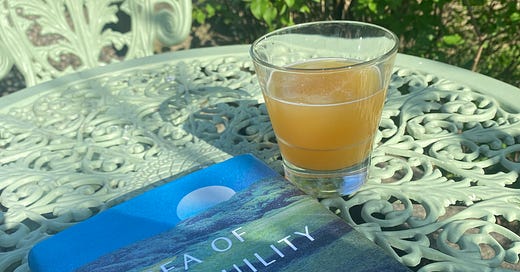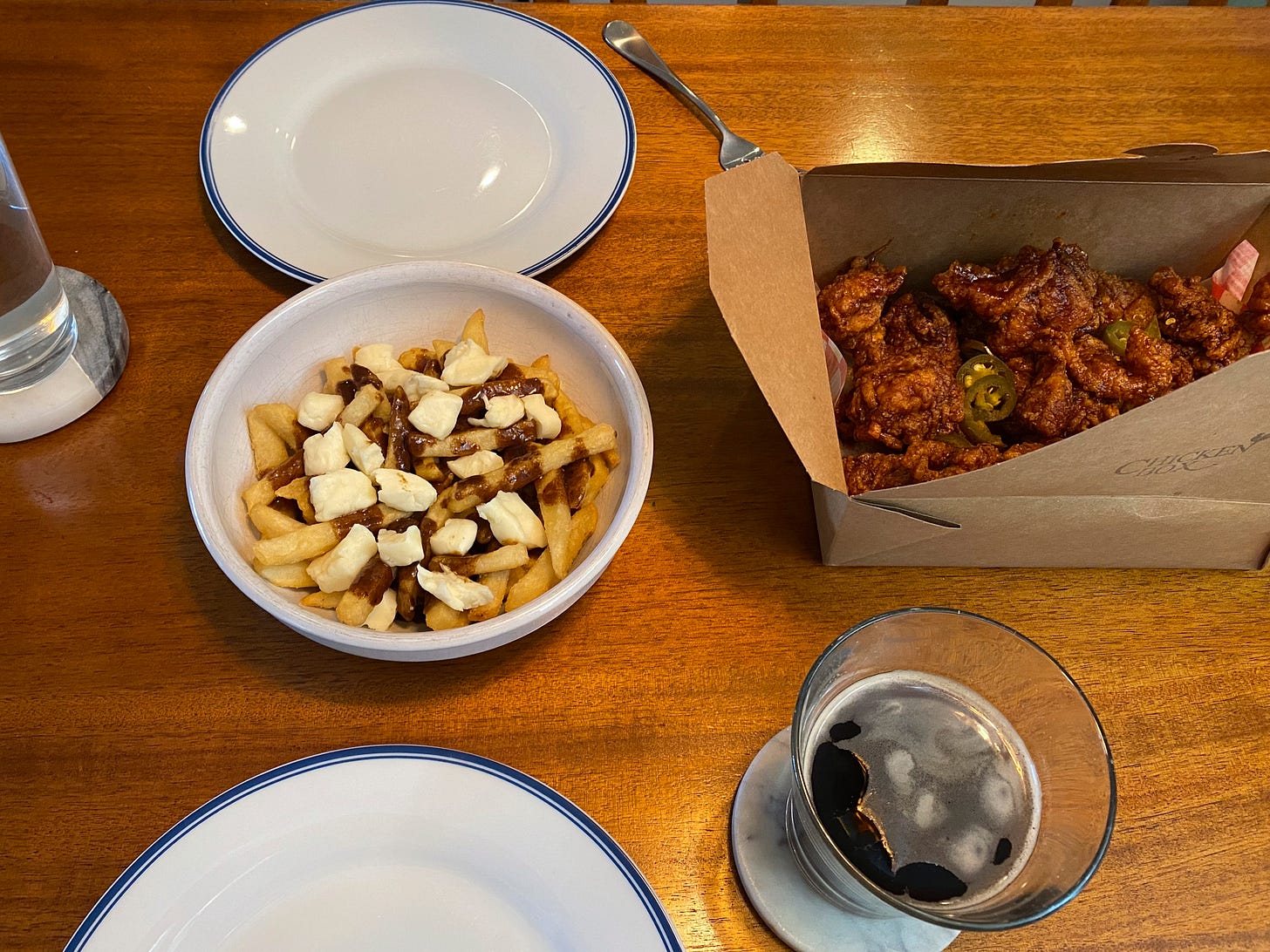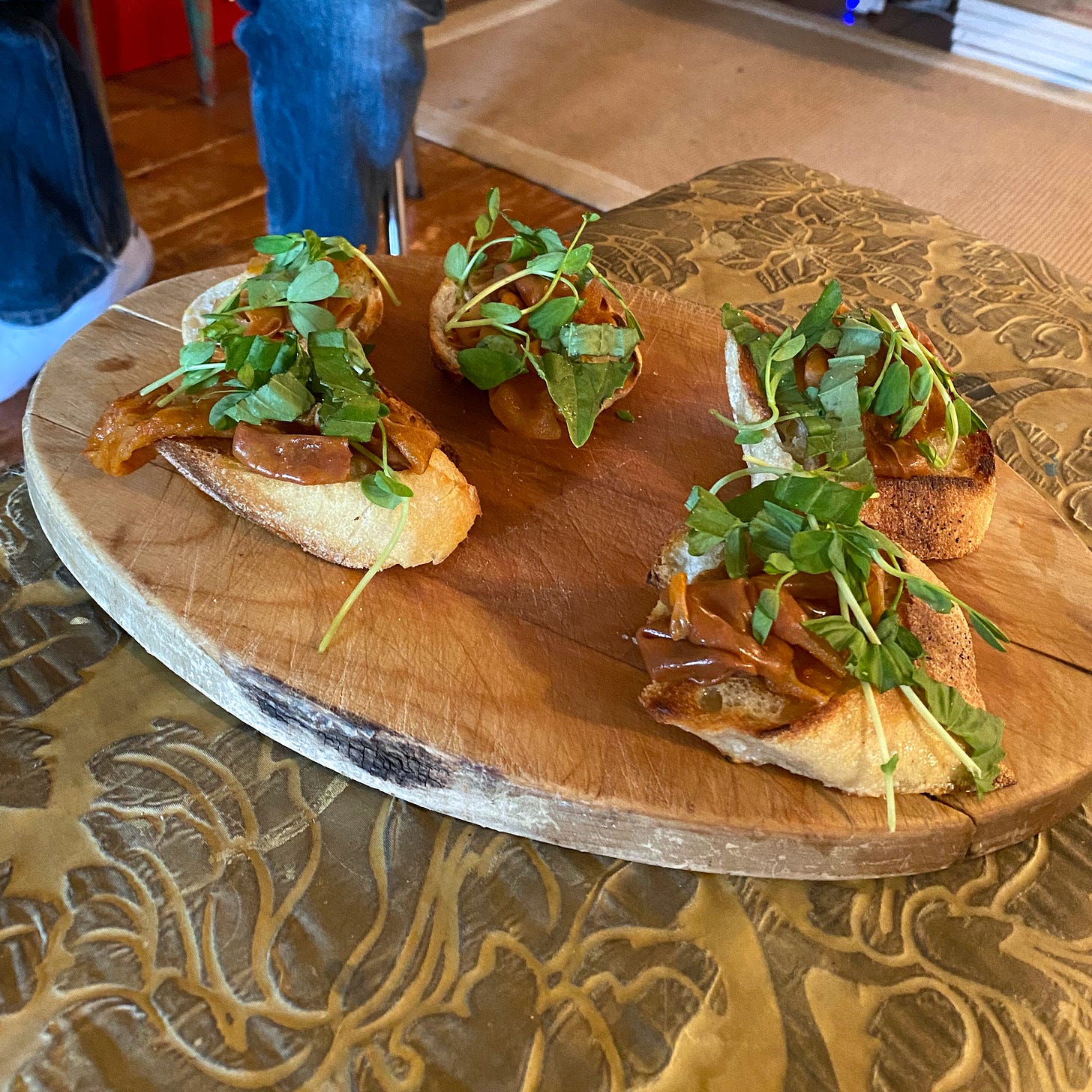I don’t know how it is elsewhere, but this past week here felt like spring came blasting through the wall of lingering cold and damp like the Kool-Aid man. Last Friday I came home from work and got to indulge in a favourite warm weather activity: reading a book in the yard. It’s extra nice right now with the lilac bush starting to bloom. Temperatures were in the mid-twenties on Saturday and Jeff and I finally, finally, were able to get some things planted in the garden. Some of the herbs from last year are coming back, and so are some of the potatoes, which is exciting. We pulled up all the kale we’d left growing over the winter to make room for new growth, and much of it was still fine to eat— we harvested over a pound and a half!
In between raking in compost and sprinkling seeds and pulling weeds, we took a break to ride bikes up to Lonsdale so I could go to the used bookstore and Jeff could pick us up some donuts at Cream Pony. We usually manage to limit ourselves to one each, but always cut them in half so we can share. That way it feels like you’re having more.
When we finished, I got to reward myself with a nice cold lager (THE yard work beer) while I joined a watch party for my Trek book club, and later Jeff and I decided we deserved to not make dinner, so we ordered from Chicken Box again. This time we got the hot Nashville style, and made poutine out of our side of fries, since we still had gravy and cheese curds left. It was excellent
.
Sunday was less spectacular weather-wise, but that’s okay, because it was tapas cookoff day. In the morning, I baked a fresh loaf of sourdough for it, and figured it would be a good opportunity to make a version of this recipe, which I’d been eyeing. I wanted something that would use the flavours of pimentón and evoke the feeling of salty canned fish, both of which tend to feature on tapas menus. Amanda, who has been vegan for many years, did significant research in preparing for this cookoff since she had no idea what actually constitutes tapas, and filled us in on the origin she discovered. Most of us know that tapas are served in Spanish bars as a way of keeping customers ordering drinks (the way salty peanuts or pretzels might be put on a bar top here), but Amanda learned that the etymology of the word tapa is derived from a verb meaning ‘to cover’. Initially, pieces of bread or cured meat were used as a sort of lid to cover drinks in order to keep insects away from sweet wines or sherry, and over time, evolved into the elaborate snacks we see now.
This dish was fun to make, and turned out nicely salty and a little smoky, just like I wanted. I used less broth and more of almost everything else in the recipe in order to get a result that was more of a dip or topping rather than a chunky soup. I liked how the kale broke up the texture, but I also think it would be good with just the beans, roasted peppers, and olives in the seasonings. Instead of putting the capers into the mix, I fried them in the garlic oil after removing the garlic so that they got crispy, and used them as a topping, because they’re fun that way. Toasting the bread in a cast iron with the garlic oil was great too, because it really sinks into the outer layer of the bread and you get the nice char at the edges. This would also be good to do on a grill, I think.
Most of us went the bread route— we had pan con tomate as well— and there were two different interpretations of fried mushrooms (sadly, no one made patatas bravas). Liang was the winner for her ingenious method of making jamón by marinating rice paper! The texture and flavour was amazingly similar, and so good. This was a fun cookoff for the ‘seconds’ aspect: once serving and voting is completed, we put the leftovers together on the table and do some mixing and matching.
Because we still had so much kale, I made something similar to the potato & kale enchiladas in the Veganomicon, which I’ve made in the past and liked. The thing about making enchiladas is that they aren’t difficult to make, but it’s a multi-step process you generally don’t want to subject yourself to on a weeknight. Making lots of the enchilada sauce and putting some in the freezer is a nice gift for my future self, because it means the next time I make them I just need to prepare the filling and thaw out the sauce. But I didn’t mind doing all the steps this time, because Steph had come over to watch a movie after dinner, so I had her helping me pull the kale off its stems and Jeff doing dishes as I finished with them. So it didn’t seem quite as defeating as when you finally put an elaborate dish in the oven and then have to conquer Dish Mountain.
I found the original recipe a little on the plain side when I made it in the past, so I added more seasoning to the mixture, and some leftover white beans from the cookoff for extra substance, too (pepitas inside the enchiladas was weird to me, texturally, so I just put them on top as a garnish). I’m also not a huge fan of corn tortillas for this because they break so easily— flour tortillas I can just roll up like a burrito and then cover them with the sauce. And it feels a little wrong to de-veganize a vegan recipe, but I need the cheese! We used aged cheddar on top, and these came out really delicious and filling. I might even make them again, because there’s still an obscene amount of kale in the fridge.
We also had a surplus of peppers and tomatoes this week, because I forgot to check on what was in my produce bin delivery to adjust it, and ended up with some things we’d already bought (do not ask about the 5lb bag of apples I now also have to deal with). Shakshuka seemed like the thing to do to use some of them up, along with the leftovers from the loaf of bread I’d made for the cookoff. I mostly use Ottolenghi’s method from the book Plenty, but I find the recipe a bit too sweet as is and I prefer a softer texture, so I use less peppers and more tomato. It’s kind of like making pasta sauce that way: just make it the way you like it and don’t worry too much about how ‘authentic’ it is. I also like to add feta if I have it, which I usually do at the same point I add the eggs, and a sprinkle of herbs on top makes it feel fresh and a little fancy (I used cilantro, mint, and oregano).
There was a bit of the garlic oil left from the cookoff, so I brushed the toast with it. And I’m getting better at poaching eggs in the sauce and not overcooking them, but this time they were a smidge underdone. Jeff told me about a restaurant trick of using a brûlée torch— not to blister them, but holding it just far enough away that the flame gives the tops a bit of intense heat so they aren’t runny. The pan lid never seems to reflect enough heat back to cook the tops enough before the bottom of the yolk gets overdone. I might try it next time.
Media:
I’ve been following the WGA strike via twitter, and as always, I am in support of unions and of all workers’ rights to strike. This in particular feels like a tipping point where things are extremely bad and will get worse if we don’t start fighting back, and it’s great seeing so much solidarity for a creative sector that is highly undervalued and is likely to become more so as people with decision-making power start to believe in the power of AI to actually create material rather than just regurgitate things it has learned. Obviously, this isn’t the only thing at stake here, but it’s worth remembering. Writing is more than just putting words together, and no actual writer wants their job to be getting paid peanuts to rework the garbage nonsense an AI came up with into something useable when it would have been easier and better quality if they’d just been paid to do it themselves from scratch.
WGA members are sharing stories as they picket, residual cheques for pennies, getting paid day rates that sound good only to be found out you’re only in studio one day a week, and so on. One writer on The Bear was nominated for an Emmy, and attended the ceremony with a negative bank balance and a bowtie he’d bought on credit. The main gist of it is this: studios have the money to pay writers more, and they won’t. As Last Week Tonight writer Josh Gondelman says in the article above,
These companies are not pivoting to streaming because they have a passion for innovative technology. They’re doing it because it’s profitable. Claiming that they can’t pay us fairly because they’ve chosen to distribute our work on an app rather than a television channel is disingenuous. They can, but so far they have refused.
As someone who writes most of the time via the flashlight method, the below tweet felt so real to me (screencap instead of embed because their account is now private, presumably because the tweet got popular and started garnering negative attention). How can our society acknowledge that we need art and media as part of what makes our culture rich and our lives enjoyable, while simultaneously refusing to acknowledge the importance of the people who work to create that art and media for us? How can we act as though writers can be replaced by computers, and should be happy for the crumbs they’re thrown?
Thanks for reading— if you enjoyed this newsletter, please share it with someone new! I like providing this to you for free, but it does still involve time and effort, so donations I can use towards cookbooks or future treats are much appreciated. Finally, I don’t know how to preface this, but I laughed.









